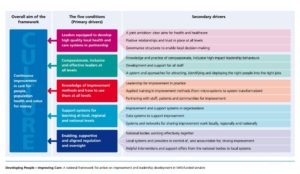Social prescribing is a means for GPs and other primary care professionals to refer patients to non-medical interventions that can be used to improve their physical or mental well-being. The kinds of options available for prescribing could include walking groups, knit and natter groups, cookery classes, adult learning, volunteering, and self-help reading (the Books on Prescription scheme is an example of social prescribing).
Social prescribing is mentioned in the NHS England document ‘Next Steps on the Five Year Forward View’ and in the General Practice Forward View as a means of reducing avoidable demand, with an aim to work with the voluntary sector and primary care to ‘design a common approach to self-care and social prescribing’. A national clinical champion for social prescribing was appointed by NHS England in 2016.
Social prescribing is a feature of many local Sustainability and Transformation Plans (STPs), including the one for Shropshire and Telford & Wrekin.
What examples are there of social prescribing in practice?
There are plenty of examples, some of which are listed in the evaluation carried out by the University of York on pages 5-7. The Commissioning Handbook for Librarians provides suggestions for searching for material about social prescribing which will help identify more.
The Rotherham social prescribing service is a very large scheme, and was mentioned in the NHS Five Year Forward View as an emerging model for the future.
What's the evidence for social prescribing?
A systematic review carried out in 2016 and published in BMJ Open found that there was there was little good quality systematic evidence to inform the commissioning of social prescribing programmes, as did a previous review of 2015 published by the University of York’s Centre for Reviews and Dissemination.
There is some evidence that social prescribing schemes can make a difference to outcomes such as quality of life, levels of depression, and reduction in use of health services, and social prescribing schemes show high levels of satisfaction from users and health care professionals. However, much of the evidence is qualitative, is from self-reported outcomes, and is from small-scale schemes. Most studies focus on a particular intervention rather than social prescribing generally. Evidence on the cost-effectiveness of social prescribing is limited.

